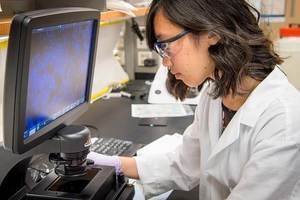From studying Fragile X Syndrome to understanding algorithms for artificial intelligence, 47 students participated in a summer’s worth of research, thanks to the College of Science Summer Undergraduate Research Fellowships (SURF).
The program is made possible through donors and in collaboration with the Center of Undergraduate Scholarly Engagement, Indiana University School of Medicine–South Bend, and the Glynn Family Honors program.
During the program, students gained experience completing their own research outside the traditional structure of the classroom, with most citing that autonomy as one of their favorite aspects of the program.
“I really love the independence and kind of detective-like work in pursuing my own project, and being here over the summer has given me the opportunity to get far more done and grow far more proficient than I could ever imagine doing during the school
 Gabrielle Mungcal
Gabrielle Mungcal
year,” said Gabrielle Mungcal, a senior majoring in biological sciences who worked in the lab of Reginald Hill, the Archibald Assistant Professor of Cancer Biology at the Harper Cancer Research Institute and assistant professor of biological sciences.
Mungcal researched chemoresistance and a protein, GRP78, involved with pancreatic cancer. Pancreatic cancer has a five-year survival rate of only 7 percent and often resists chemotherapy. Mungcal’s work targets the GRP78 protein because it’s been demonstrated to increase during chemotherapy. “This is because GRP78 plays a role in tumor survival pathways,” she said. “Literature has shown that this GRP78 and chemoresistance phenomenon is not unique to pancreatic cancer, so I applied what we learned to certain types of breast cancer.”
Senior William Morgenlander, who is majoring in biological sciences and physics, also studied cancer. Working with Xin Lu, the John H. and Mary Jo Boler Assistant Professor of Biological Sciences, Morgenlander studied the progression and metastasis, or spread, of prostate cancer.
“Beyond just protecting people from infections, the immune system normally functions to prevent cancer,” Morgenlander said. “However, as a tumor forms, it learns ways to avoid or shut down the immune system.”
New types of cancer treatments, called immunotherapies, take advantage of the body’s defense mechanisms by activating the immune system to fight cancer, he said. In his work, he studied how tumors survive immunotherapies. The research should help advance future drug development.
“I appreciated having increased independence in the lab,” Morgenlander said about his summer research. “From troubleshooting an unsuccessful experiment to gathering information for further experiments, working on an independent project has promoted my understanding of cancer research.”
To explore what it’s like to do undergraduate research, visit the Fall Undergraduate Research Fair (FURF) from 6 to 9 p.m. Thursday, Oct. 26.
Full article originally published by Deanna Csomo McCool at science.nd.edu on October 23, 2017.